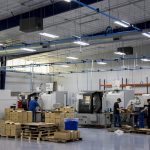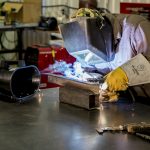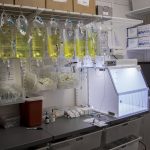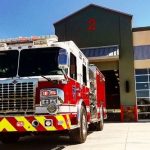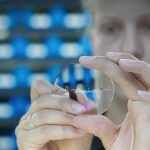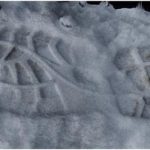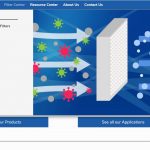Benefits of mist collectors include reducing maintenance and downtime, as well as safeguarding overall shop safety and employee health for CNC machine shops. Government organizations, such as OSHA, legally require employers to meet exposure limits. Machining, milling, and grinding processes produce oil mist when metalworking fluids come in contact with tooling components and become… Learn More
Hazards of Welding Fumes
Welding produces hazardous fumes that must be controlled to safeguard employee respiratory and overall health. Welding exposes metals to high levels of heat creating gaseous fumes and nano-particles. The hazards of welding fumes depend on the contents of the metal, the type of welding process, and the frequency of welding. Fume extractors must be utilized… Learn More
IV Bag Preparation Best Practices Utilizing ISO Class 5 Laminar Flow Hoods
Medical professionals and naturopathic/holistic doctors have utilized IV vitamin/nutrient therapies for many years as a more natural approach to treating chronic conditions in patients. As opposed to oral medications or supplements that travel through the body’s digestive system, whereby diminishing absorption capabilities, IV therapy delivers optimal levels of the necessary vitamins/supplements directly to the bloodstream;… Learn More
Fire Station Diesel Exhaust Fume Control
Diesel exhaust fumes pose health risks to firefighters. Diesel powered firetrucks emit harmful diesel exhaust when entering and leaving the fire station. These fumes must be properly controlled in order to prevent continuous exposure to firefighters1. Without proper diesel exhaust fume control, the hazardous fumes may enter living quarters at the fire station increasing… Learn More
Particulate Control for Eyeglass Lens Production
Reflective surfaces have been used to magnify and enhance vision since the early 1200s with the discovery of the magnifying glass made of quartz and beryl lenses1. Glasses were introduced to the general public by Alessandro di Spina. Due to high demand, quartz and beryl lenses were quickly replaced with glass. Modern day eyeglass lens… Learn More
Fume & Particulate Control for Forensics 3D Printing
Forensics 3D Printing In recent years, forensics 3D printing has increased usage in the forensics and law enforcement fields due to more economically-priced printers, lasers, and scanners. Additionally, the seemingly infinite printing possibilities and uses in these fields have led to greater adoption of this technology. Historically, law enforcement and court officials have relied heavily… Learn More
Filter Center & Benefits of Changing Your Filter
New Filter Center Our new Filter Center makes it simple and easy to place filter orders! Simply fill out the Reorder Filters Form and our team will contact you within 24 hours. Your filter type can conveniently be found on the side of the control box or on the filter itself. The Filter Center can… Learn More
Mycology Culture Sampling & Testing
Mycology, a branch of biology, focuses on the study of fungi. Heinrich Anton de Bary, a research botanist from Germany in the 1800s, is credited for his ground-breaking research on fungi-related plant diseases, which laid the foundation for modern mycology and plant pathology. The field of mycology is vast and includes a wide array of… Learn More
Introducing our New Ductless Fume Hood: Sentry AirHawk
Have you ever been working under a fume hood and desired to have a brighter adjustable light or the ability to change the fan speed depending on the application requirements? With the Sentry AirHawk, the operator has more options for adjustments with the centralized control panel. The control panel features an adjustable light and fan… Learn More
What is a Ductless Fume Hood?
A ductless fume hood is a contained working space that uses powerful negative airflow to pull harmful fumes, vapors or particulate away from the operator’s respiratory zone and protects the operator and the environment from exposure. How does a Ductless Fume Hood work? Ambient Air is drawn into the hood and mixed… Learn More

 Made in the USA
Made in the USA
